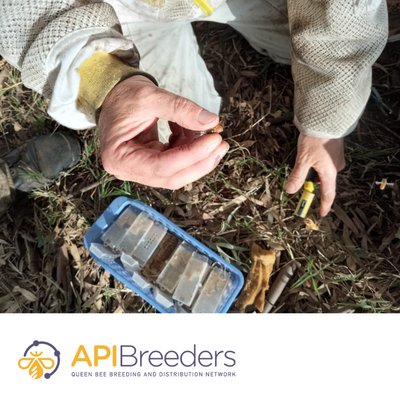
When we talk about logistics, we talk about managing the associated physical and information flows, that is, getting something to someone in the most efficient way possible.
When that something is living animals, the complexity increases significantly, both due to the physical characteristics of what moves -living animals-, as well as the associated information and documentation.
The seasonal characteristics that condition beekeeping production in the face of minimal climate variations make it very difficult to forecast the demand flows for queen bees, and therefore the coordination between production/stock, orders and means of transport must be very flexible and agile.
Both the queen breeder and the beekeeper who requires them are subject to this climatic conditionality. If one and the other are in different geographical locations, it may happen that the beekeeper is in an excellent situation to use the mated queens he needs, but that the breeder is in an adverse situation to produce or dispose of them. And although breeders use techniques for queen stocking, this has a significant cost and many limitations.
However, if you know how to take advantage of it, there are great advantages in the fact that the breeder and beekeeper are in different geographical locations. When the supply of queens is climatically ahead of demand, the biological cycle allows the breeder to anticipate production and have mated queens in optimal conditions when demand arises.
This easily foreseeable situation from the production point of view, for it to be a real advantage, requires the use of adequate logistical means because if the distance between the breeder and the beekeeper is significant, efficient management of the means of transport, use of packaging, the handling of living material and the management of information flows will all be essential.
Another fundamental axis of management that arises from the commercial movement of bees is the required documentation. As it is living material, there are a large number of sanitary, transport, tax and customs regulations that require compliance in a timely manner, especially in international trade. An error or breach in administrative management can lead to the blocking of bees by the authorities, and given the impossibility of storage for an indefinite period, this can be fatal.
For all these reasons, logistics management is of vital importance. It is necessary to have a professional team in the field that not only knows the scope of the regulations and processes but also knows how to make decisions in the face of the risks of uncertainty that this industry presents. One of the fundamental tools in which progress must be made in this regard is in digitization processes, both at a logistical, commercial and administrative level.
The important commitment of APIBreeders to advance in these digitization processes is part of improving the efficiency of the queen bee trade, which results in an improvement in animal welfare, greater sanitary control and transparency for beekeepers, whether they are breeders, producers or providers. service: e-commerce, blockchain traceability or genetic recognition technique are some of the ongoing projects that APIBreeders is working on.
Define this text in TornadoStore Control.
We use cookies to customise and improve the content delivered to you, making sure you'll get the best online shopping experience. By clicking "Accept All Cookies", we can continue to show personalised offers and inspiration, based on the things you like. If you want to learn more about cookies and why we use them, visit our Cookie Policy page anytime.